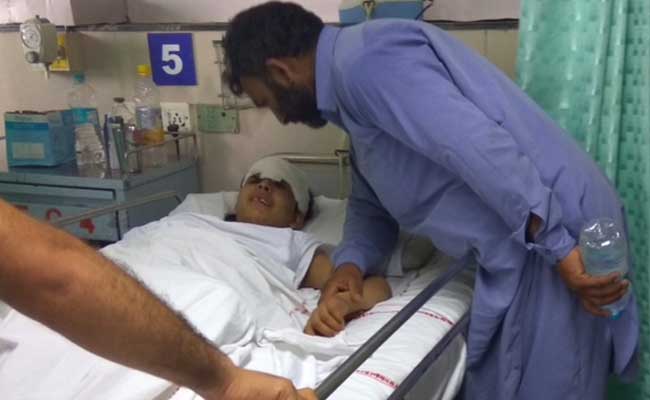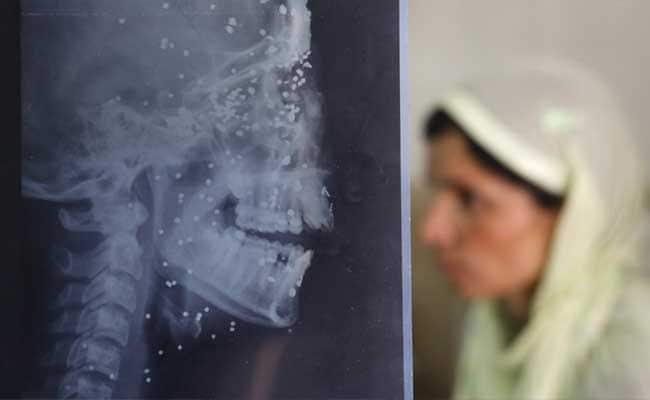It is just over a month since she last saw the moon, slender in the Shopian sky, signaling the observance of Eid and family celebrations. Three days later, her world would plunge into darkness.
But on that night, the protests had retreated in the area of Sadow where she lives. Curious at the sudden silence, she came out to the window of the upper storey of her home. The security forces were still around. They saw her. They targeted her. They shot the pellets straight to the centre of her forehead.
She has been blinded. She was treated first in Srinagar, then shifted to Delhi. She has undergone two surgeries on her forehead, now infected but treatable. Nothing could be done to save her eyes. The pellets destroyed her vision. She is just 14 years old.
She is no terrorist, she is the price Kashmir is paying for broken promises, for opportunist alliances, for the nature of the Indian State which believes that the force of a bullet or a lathi or a security camp can answer the political questions raised by history.

14-year-old Insha Malik was hit in her eyes by pellets when she was watching protests from the window of her house in the South Kashmiri town of Shopian
If this had happened anywhere else in the country, the national outrage would have engulfed the government. But this is Kashmir, and we have a government at the centre which believes and acts as if the current unrest and anger is all Pakistan created. For the BJP, Kashmir is an issue of territory, whereas Kashmir is in reality a test for the secular, democratic and federal nature of the Indian republic.
There is no doubt that Pakistan, itself threatened by terrorists of all hues, has encouraged extremists it has sent across the border, year after year. But to attribute the unrest on the streets today to being Pakistan orchestrated is to add further insult to the people of the Valley and conceal the primary responsibility for this unprecedented alienation of the people, particularly the youth of Kashmir, which lies in the failure of successive state and central governments to keep their promises.
The core of the issue is the concept of the special status of Jammu and Kashmir guaranteed by Article 370 of the constitution, which provides for maximum autonomy for the state. Successive governments at the centre have betrayed the promise made to the people of Kashmir on the guarantee of autonomy. Although it remains on paper, in fact it has been totally trampled upon, and its provisions virtually eliminated. Numerous committees which had been set up have given recommendations to restore autonomy and ensure the rights of the people of Kashmir - all have been ignored. After the summer of 2010, when 120 people died in police firings to put down widespread protests against encounter killings, the government set up another committee under Dilip Padgaonkar whose recommendations are long forgotten.

An x-ray sheet shows pellet injuries on Insha as a relative sits by her hospital bed in Srinagar
Meanwhile, Muslim extremists and fundamentalists who had been shunned and isolated by Kashmiriyat, the binding force and ideology of the state, are making deep inroads, egged on from across the border. On this side of the border, RSS and BJP leaders speak the same language, the only difference being that they speak in the name of a different religion. The secular basis of Kashmiriyat is being destroyed blatantly and nakedly by the forces of unreason and fundamentalism, whether representing Hindutva or Muslim extremism; and the government of India's policies are aiding this destruction.
What is required is an urgent political intervention initiated by the central government of an all-party nature to start the process of an unconditional dialogue with all sections of Kashmiri society. It is essential to give strict orders to withdraw the use of weapons like pellet guns which blind, maim and kill. It is also urgently required to scrap the draconian AFSPA (Armed Forces Special Powers Act). It is also essential to punish personnel responsible for the use of excessive force. The dialogue with Pakistan should resume while continuing to reiterate the no compromise policy vis-a-vis Pakistan-backed terrorist activity.
While parliament will discuss these issues, far away from the decision-making centres, an innocent victim of those wrong decisions, Insha, lies on her bed, hoping to recover her eyesight. Insha's father Mushtaq has a deep sense of dignity. He is a truck driver, but since he met with an accident recently and suffered injuries, he has been unable to earn his usual living. His brother died recently and so he is looking after that family too. He took a loan of 50,000 rupees after his daughter Insha was blinded and injured so that he and other members of his family could travel with her to Delhi. But he does not speak of himself or his grief. He asks only "will we ever get justice?"
It is a question for which Delhi must find urgent answers.
Brinda Karat is a Politburo member of the CPI(M) and a former Member of the Rajya Sabha.
Disclaimer: The opinions expressed within this article are the personal opinions of the author. The facts and opinions appearing in the article do not reflect the views of NDTV and NDTV does not assume any responsibility or liability for the same.


